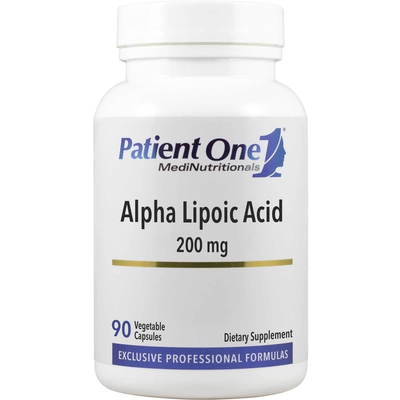Already have an account? Sign in

Provides whole-body, multi-functional antioxidant activity to support healthy, well-functioning cells
- Provides neuro-protection
- Coenzyme for glucose uptake and utilization
- Promotes healthy vascular function
- Supports regeneration of vitamins C and E
- Promotes healthy endothelial function
- Supports healthy intracellular glutathione levels
Alpha Lipoic Acid (ALA) is a fat- and water-soluble nutrient with antioxidant activity. It provides protection both inside and outside the cell. ALA has the ability to regenerate and extend the biochemical lifetime of other antioxidants, such as vitamins C and E, as well as glutathione and coenzyme Q10 (CoQ10). As such, it plays a role in fighting oxidative stress and free radical formation. As a coenzyme, ALA is needed to break down glucose for energy metabolism.
This versatile nutrient has been shown to support vascular and connective tissue health, protect cell structures, support the nervous system, help maintain healthy liver function and maintain cholesterol and blood glucose levels within normal ranges.
Alpha lipoic acid can be made in the body but production declines with age. ALA supports healthy aging, helping to neutralize free radicals before they can cause damage to the elastin and collagen in the skin that can be linked to signs of aging and wrinkles. ALA is also provides support for althletes by producing energy in muscles and directing calories into energy production.
Research
- More than a dozen clinical trials have studied the role of alpha lipoid acid in maintaining healthy nerve function. Findings demonstrate its neuroprotective function, believed to be due to ALAs ability to modulate nitric oxide metabolite activity and to promote healthy microcirculation.
References
- Teichert J, Kern J, Tritschler HJ, Ulrich H, Preiss R: Investigations on the pharmacokinetics of alpha-lipoic acid in healthy volunteers. Int.J.Clin. Pharmacol.Ther. 36:625-628, 1998
- Evans JL, Goldfine ID: ?-Lipoic acid: a multi-functional antioxidant that improves insulin sensitivity in patients with type 2 diabetes. Diabetes Technol Therap 2:401-413, 2000
- Pershadsingh HA. Alpha-lipoic acid: physiologic mechanisms and indications for the treatment of metabolic syndrome. Expert Opin Investig Drugs. 2007 Mar;16(3):291-302 [PMID: 17302524]
- Foster TS. Efficacy and safety of {alpha}-lipoic acid supplementation in the treatment of symptomatic diabetic neuropathy. Diabetes Educ. 2007 Jan- Feb;33(1):111-7 [PMID: 17272797]
- Winkler BS, Boulton ME, Gottsch JD, et al. Oxidative damage and age-related macular degeneration. Mol Vis. 1999 Nov 3;5:32. [PMID: 10562656]
- Li Y, Liu YZ, Shi JM, et al. Alpha lipoic acid protects lens from H(2)O(2)-induced cataract by inhibiting apoptosis of lens epithelial cells and inducing activation of anti-oxidative enzymes. Asian Pac J Trop Med. 2013 Jul;6(7):548-51. [PMID: 23768827]
- Singh VP, Bali A, Singh N, et al. Advanced glycation end products and diabetic complications. Korean J Physiol Pharmacol. 2014 Feb;18(1):1-14. Epub 2014 Feb 13. [PMID: 24634591]
Take 1 capsule twice daily, preferably with meals, or as directed by a qualified health care professional. May take up to 1200 mg daily.
Serving Size: 1 Capsule
Amount Per Serving
Alpha Lipoic Acid ... 200mg
Other Ingredients: rice flour, vegetable cellulose (capsule), l-leucine
This product is free of milk, egg, fish, peanuts, crustacean shellfish (lobster, crab or shrimp), soybeans, tree nuts, wheat, yeast, gluten, sugar, and artificial sweeteners, flavors, colors and preservatives.
This product is free of ingredients derived from genetically modified organisms (GMOs).
Warnings
If you are pregnant, nursing, or taking any medications, consult your doctor before use. Discontinue use and consult doctor if any adverse reactions occur.
Already have an account? Sign in
Already have an account? Sign in
Already have an account? Sign in
Already have an account? Sign in




